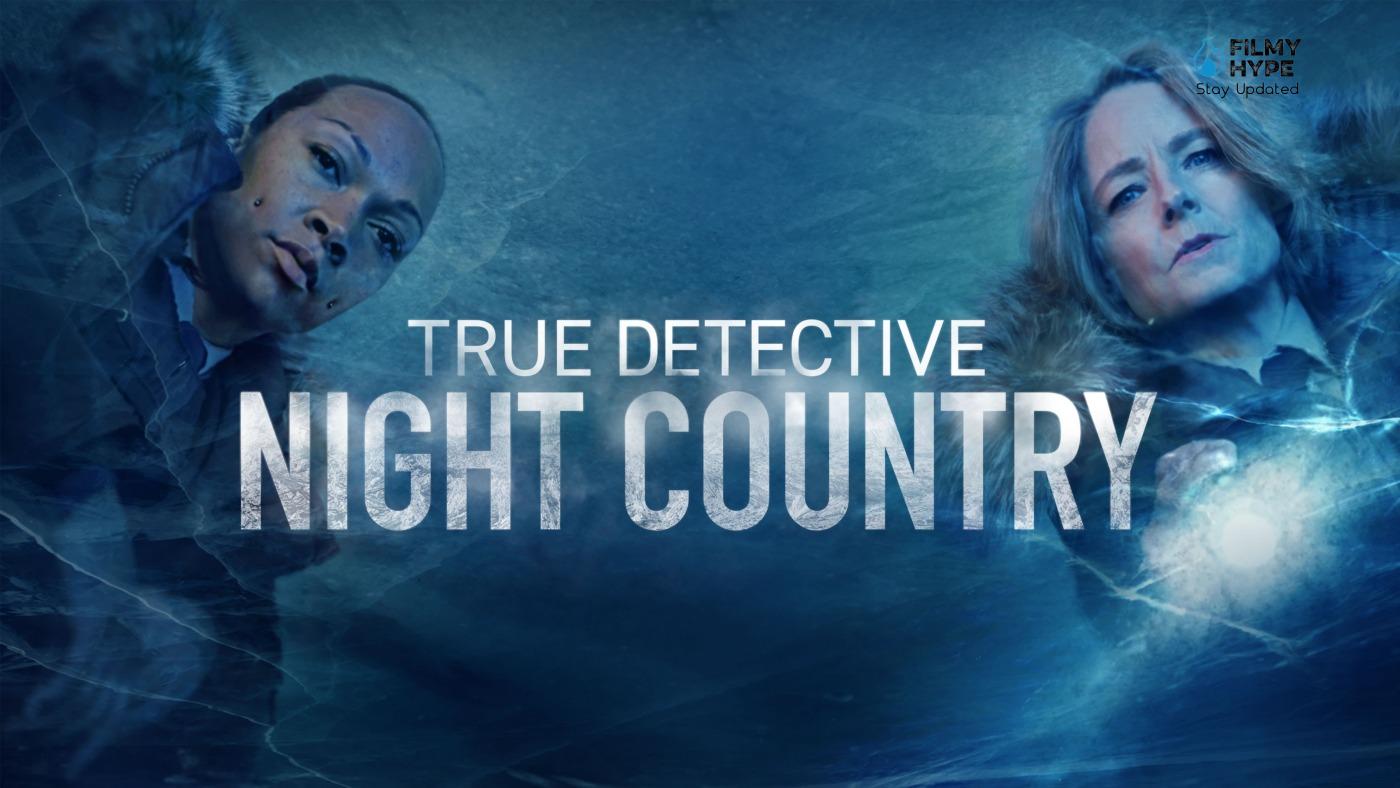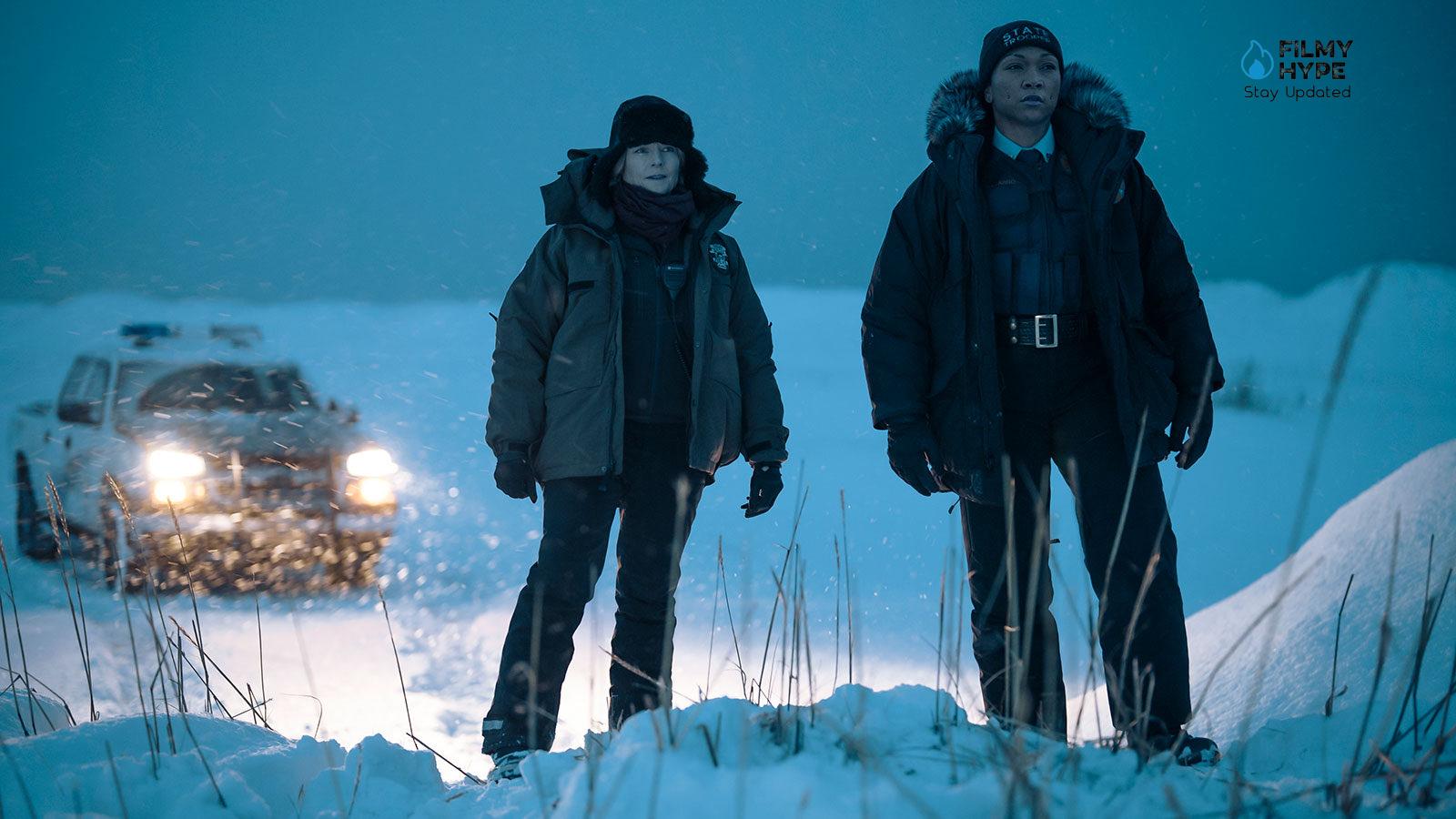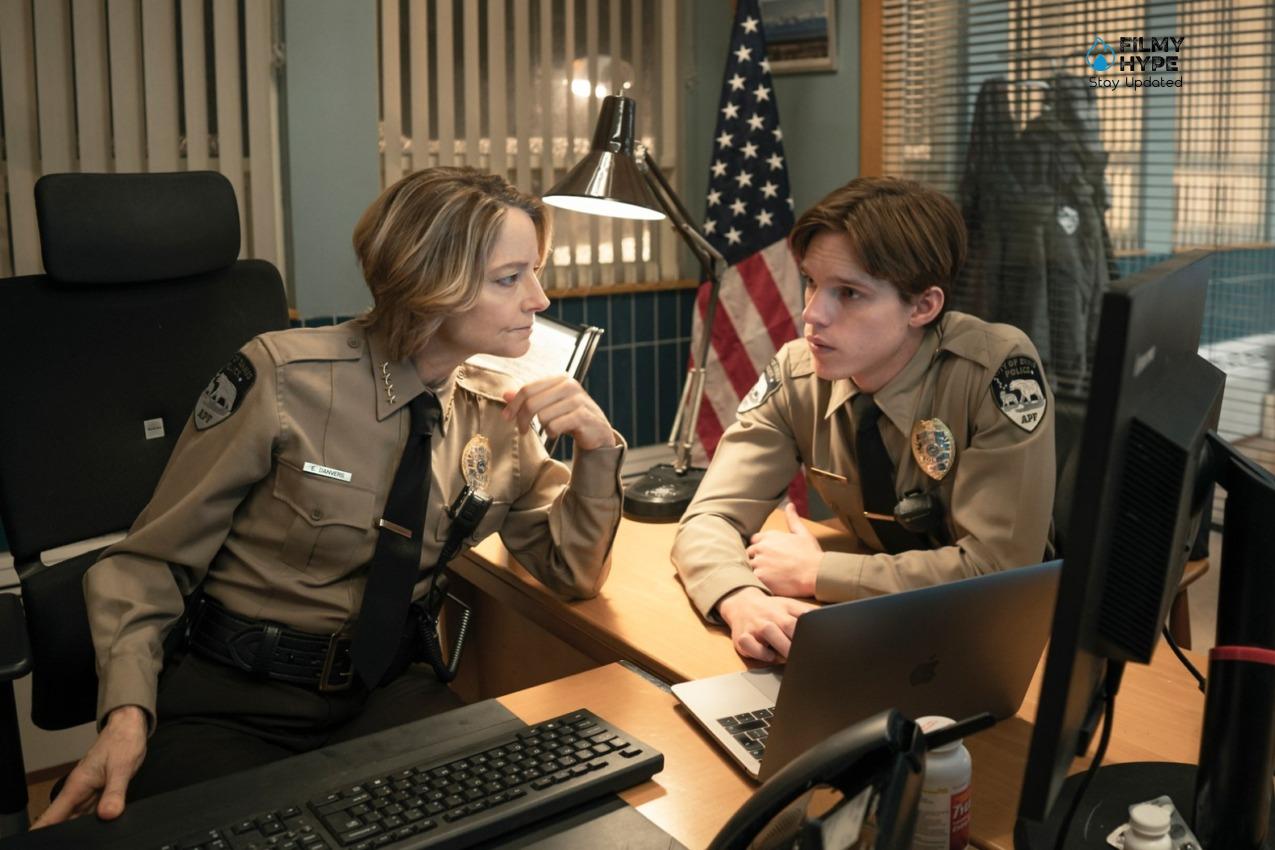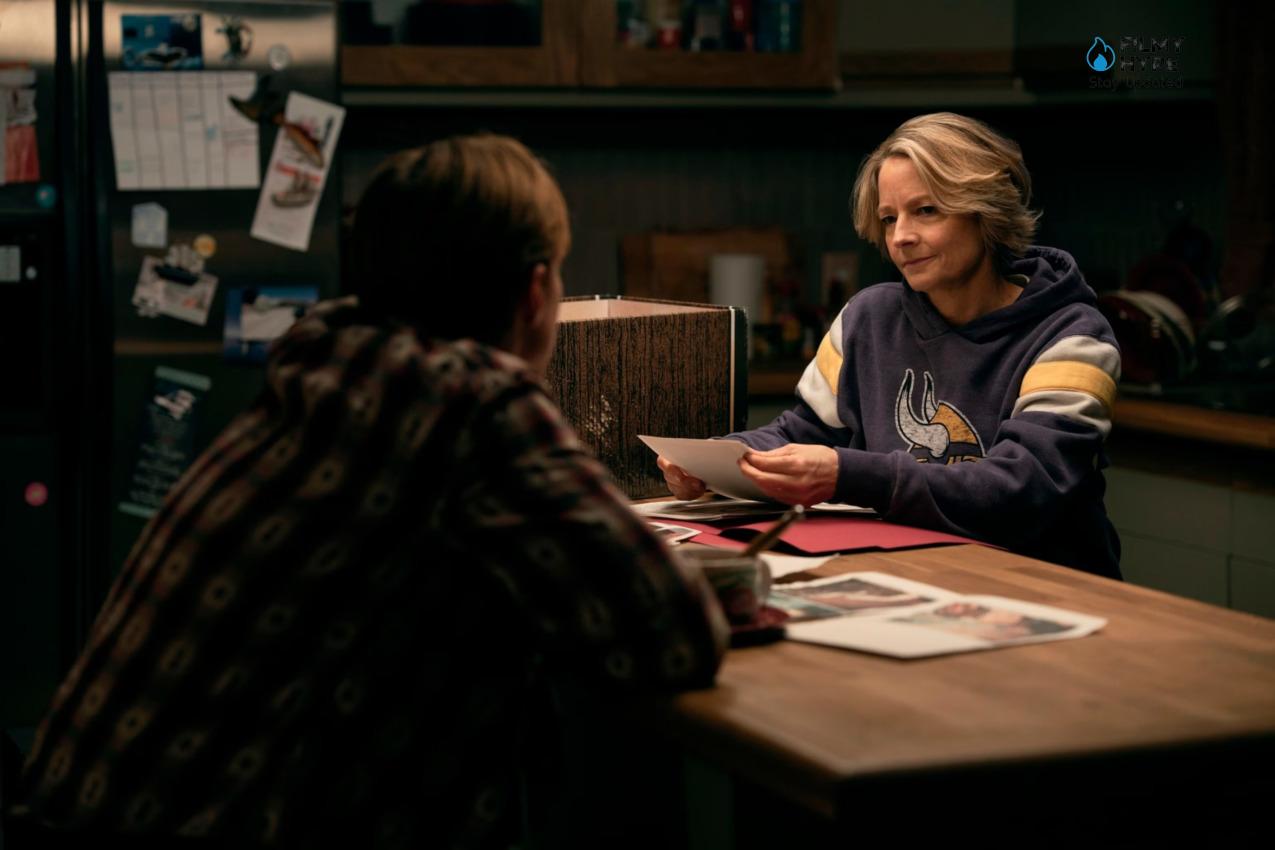True Detective – Night Country Review: When Crime Becomes Horror and Freezes
Cast: Kali Reis, Jodie Foster, Fiona Shaw, Christopher Eccleston
Director: Issa Lòpez
Streaming Platform: HBO Max
Filmyhype.com Ratings: 4/5 (four stars)
True Detective: Night Country is nothing like the first season of True Detective. Let’s remove this tooth immediately at least to avoid bold comparisons. But one of the best things is that Night Country is True Detective, through and through. Just a little different. It is in the subtitle’s mission statement (never used in the anthology seasons of the HBO series); it is in the change of showrunner, from Nic Pizzolatto to Issa Lopez, who took care of every aspect of this fourth season, from the script to the direction, making it his creation but looking into the abyss of the first and above all allowing himself to be scrutinized by what Pizzolatto had written. Issa Lopez entered the mute vortex and emerged from it in a cinematic flood that takes full advantage of the seriality and the starting product, learning its stylistic features and satisfying both first-time fans who have reviewed Rust and Marty’s investigations ad nauseam and those who enter alone now in the world of True Detective.

That she hung an extra amulet in her dark room: here’s everything you need to know about True Detective Night Country, which from January 15th will be broadcast on Sky and NOW at the same time as the US broadcast and the first season of True Detective, now ten years ago on HBO, marked a before and after in television series, especially in the crime-detective-thriller genre. After two successive fluctuating seasons that divided both the public and critics, the “surprise” series returns with a fourth cycle of episodes (this time six, two less than the previous ones) from January 12th exclusively on HBO Max Just a way to keep up with the times, between inclusiveness and representation, or a real pretext to tell something new starting from the old?
True Detective – Night Country Review: The Story Plot
The plot of True Detective: Night Country seems to resume what had made the fortune of that quartet Matthew McConaughey/Woody Harrelson and Nic Pizzolatto / Cary Joji Fukunaga, who already used the genre to talk about mysticism and religion, despite going through a case that did not only devastated the improvised and unlikely pair of detective protagonists (showing once again how work destabilizes and deteriorates those who live on bread and crime) but it relied mainly on the truth of the title, therefore on the tangible, on what can be proven with facts. Yet often – history teaches us – religious fanaticism leads to unspeakable acts in the name of faith, which is confused with obsession. And not everything can be explained. A sort of reboot but also a continuation – the famous spirals already appeared on social media as clues – the fourth season of True Detective takes that format and tries to replicate it, declining it.
If already in the third cycle it was done with the black community, this time we move on to the female vision and the Native American community of Alaska, chosen to host the new episodes. A border state, already recently reported in Daily Alaskan, and for this crossroads of cultures, sometimes even in a belligerent way, an impervious and partly inhospitable state where those who are sent take the transfer as a punishment for the difficult living conditions daily and seasonal. Just like what happens to the detective played by Jodie Foster, in her first serial experience who finds that role many years after Clarice Starling in The Silence of the Lambs. Imagine setting an investigative crime series in a place where you can’t even bury corpses. Where everything is so crystallized that you don’t even have time to express a thought externally. Where for days and days it is always night.

It is in Alaska that everything starts, after the disappearance of eight scientists in a very remote research center at the end of December, at the end of the long night. True Detective: Night Country continuously makes Alaska and what it represents on a cultural, social, and geographical level for those who live there: both for those who were born there and for those who ended up there. It is an almost Leopardian stepmother nature that attracts the eyes of the protagonists of the series into its nocturnal glass, starting from two formidable Jodie Foster and Kali Reis, who reiterate the matrix investigative duo of the HBO series. A combination gnawed by past events, a world hidden under a surface made of sharp glances and sudden anger. In this case, there are flashbacks, not timelines, but the night also takes away the very concept of the passage of time, devouring lives, careers, minds, relationships, and emotions in its whirlpool mixed with black. As if the real world were the nocturnal one, the one of dreams, where we have to look for who we are.
True Detective – Night Country Review and Analysis
A few touches are enough to get us sucked into True Detective: Night Country, like a certain beer placed on a table or the first appearance of a spiral that will become thematic within the entire series. And those who know Rust and Marty’s investigations by heart feel that electricity shivers down their spine, that of great occasions because Issa Lopez did her homework very well. His, or rather, his True Detective continually sinks his hands into lucid dreaming, just as Rust did when he saw flocks of birds taking unusual shapes. The dreamlike and openly Lynchian part in Night Country is the dark passenger that accompanies protagonists and spectators throughout the six very dense episodes of the series, leaving crumbs of clues about the characters’ pasts and who they are, triggering sudden shivers in our eyes because we know that we still once everything is important, everything is there, we just have to be good at asking the right questions.
One of the best qualities of True Detective: Night Country is its emphasis on the investigative method. It does so start from the character of Jodie Foster who cascades her intuitions onto others, bringing back a great theme dear to David Lynch and his Twin Peaks: the answer is in the question. Jodie Foster’s Liz Danvers thus repeats her mantra: “You’re not asking the right question” because that’s where the answer to what you’re looking for lies. You have to keep repeating, trying again, failing, you have to take off your glasses and use them as a magnifying glass, like the new Sherlock Holmes in a crystallized land. Only in this way can the investigation proceed and reveal what’s underneath, what’s beyond. “The secrets in the snow; will always come out in the thaw”, sang Biffy Clyro, but the secrets in the snow of True Detective: Night Country come out in the thaw between the characters, in the self-acceptance and in the flash of understanding which solves the mystery when everything seemed destined to fall asleep in the hypothermia of a story bigger than all.

The density of True Detective: Night Country is full-bodied, filling the cracks, starting from a disturbing theme song with Billie Eilish’s dragged voice repeating the dark mantra of the fourth season: “When we all fall asleep, where do we go?”. It piles up images, suggestions, and terrible realities, causing its black liquid to flow into a social context as specific as that of an Alaska divided between Inuit and Americans, between those who consider that place home and those who just want to exploit it. Issa Lopez mixes the investigation of True Detective: Night Country in a well-defined reality, in the rediscovery of oneself and in the internal struggle of belonging to a people, to a culture that is poisoned by unscrupulous capitalist progress. A silent subtext that hides in plain sight until it explodes in an ending with a disruptive feminist and cultural power, which leaves us shocked and satisfied: few words, many images. And it is in discovering who we are, accepting ourselves, that we can do this with others, even in the middle of the night of our storm. Maybe we just need to start asking ourselves the right questions.
It is the first time that True Detective has a subtitle that characterizes it, and it is not a random choice. We won’t reveal what the Night Country of the title is to avoid spoilers, but we can tell you that it all starts from the fact that in Alaska (in this case in Ennis) there are several days of darkness, a “long night” like that of the proverbial world of A Song of Ice and Fire. Once again – as already happened in The Terror, The Head, The Rig, always keeping The Thing in mind as the primary reference – the investigations start from the disappearance of eight men who managed the Tsalal Arctic Research Station, who disappeared from the station in the Arctic without leaving no trace. The case will lead the two detectives to have to team up again after they had separated many years before, to reopen old wounds and an old case that obsesses them, and above all to look inside the secrets of the town of Ennis and their homes and families highly dysfunctional.
Jodie Foster and Kali Reis are therefore the new Matthew McConaughey and Woody Harrelson: two women hardened by life, stubborn, determined, with a quick and often frowning look, characterized by great silences rather than flowing dialogues, who prefer to take action rather than rely on words. Liz Danvers (Foster) is pragmatic and strongly believes only in what she sees and can touch and feel, perhaps also because of the losses she has had in her life which led her to raise her stepdaughter, a desperate native teenager searching for one’s origins and one’s place in the world. Evangeline Navarro (Reis), perhaps due to her cultural heritage, instead feels much closer to the world of spirits and above all to the limbo that exists in between, to what she cannot explain with facts and evidence, also because it is a belief It is common that the dead return to Ennis to communicate something to the living.
Just like in Daily Alaskan, even if there were journalists, and just like in the first season of True Detective, the couple are two polar opposite detectives who, however, are ultimately much less “opposites” than they would like to admit. In this case a white policewoman and a Native American, an increasingly dear theme in the United States, of the population’s reappropriation of its tradition and cultural heritage. Losing its creator to True Detective has paradoxically been good because the vision of Issa López (already behind Tigers Are Not Afraid) is timely and centered in the new-old format of the HBO series, which once again finds itself mixing religion and mysticism which leads to answers, even if they are not the ones you wanted to find.

Among the issues addressed, precisely because of the female vision in front and behind the scenes, there is not only the mourning process but also violence against women and Native American women specifically, together with environmental pollution. The cast contributes to this ensemble: among the performers we mention the always mysterious and charismatic Fiona Show (Fleabag, Killing Eve), the rediscovered Christopher Eccleston, and the cryptic John Hawkes, together with the emerging surprise Finn Bennett (keep an eye on him as he might reveal something else) few twists). Even the chosen setting – from the heart of the US hinterland we move to the borders of the United States towards the Arctic – is not random, just as the Christmas period is not. This allows for photography and an atmosphere that is very reminiscent of horror, which just like in Murder in Venice, combines deductive investigations with what cannot be explained.
It also allows the narrative pretext of the world on the border that it narrates – such as that of the living and the undead – and at a directorial level large aerial shots, suggestive very long and total shots, in contrast to close-ups and details which, right from the looks of the characters, make understand how complex it is to live in territories like those. Or perhaps simply live, today, with pain and death in your heart and your professional and family history. Therefore, True Detective: Night Country not only does not disappoint as the fourth chapter of the series, on the contrary, it successfully differs from all the others. Also, thanks to a subtle humor that permeates the story and enriches it further. The feeling is that the female dimension of the story also played a role in this change of tone. And not only for the different gaze and approach of the protagonists. Simply, the vitality and passion of Danvers and Navarro warm up a series that has so far been very rational, almost philosophical. And that this happens on the ice of Alaska is an added ironic touch.
And now we come to the big winning point of True Detective: Night Country: Jodie Foster. The character of Liz Danvers is beautifully written. She has Clarice Starling’s wit (and yes, we believe the reference is intended), but a new warmth. Danvers is masculine but not repulsive, she is a stern but respected boss, and she manages to be an intelligent mentor to the young agent Prior. She helps the boy reconstruct the puzzle of events, maieutically pushing him to always look for the right questions. In this micro tension, there is all the strength of a series that also accompanies the public to discover the truth, without providing pre-packaged answers. Or throwing on the carpet only and exclusively the torments of the investigators. She is not a perfect woman, or in search of perfection and she shares the path with her partner Navarro, an excellent and measured Kali Reis. But she is one of those female figures impossible to forget, embodied to perfection by an actress in a state of grace.
True Detective – Night Country Review: The Last Words
There is truly deep care on the part of Issa Lopez in the making of True Detective: Night Country. A dense narrative, with Lynchian references, capable of taking the stylistic features of the astonishing first season and adapting them to a cold story, made of distance and incommunicability, of silences and truly superhuman spaces that the characters of Jodie Foster and Kali Reis must navigate. All in a well-defined cultural context that becomes an integral part of the story as the mystery is revealed, through an investigation placed at the center of the plot in all its forms, for a fourth season that perfectly mixes the essence of True Detective and a very powerful social message. The fourth chapter of True Detective, Night Country is a majestic series that is credited to a project born in 2014 by Nic Pizzolatto, perhaps a little exhausted. Issa Lòpez reinvigorates the story, bringing on stage two protagonists who are impossible to forget, with Jodie Foster in a state of grace.






